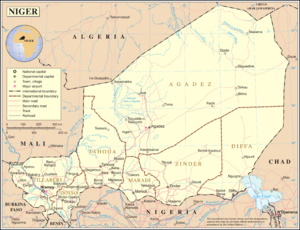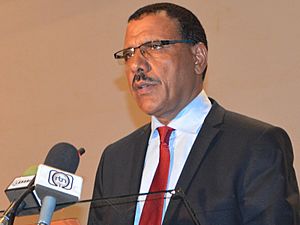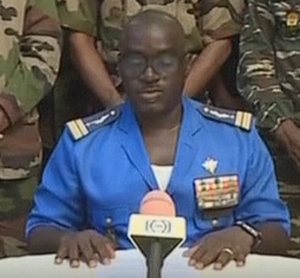2023 Nigerien coup d'état facts for kids
Quick facts for kids 2023 Nigerien coup d'état |
|||||||
|---|---|---|---|---|---|---|---|
 |
|||||||
|
|||||||
| Belligerents | |||||||
Presidential Guard |
|||||||
| Commanders and leaders | |||||||
| Mohamed Bazoum Hassoumi Massoudou |
Amadou Abdramane Omar Tchiani |
||||||
On July 26, 2023, soldiers in Niger took control of the government. They arrested President Mohamed Bazoum. Another group of soldiers announced that the president was removed from power. They closed the country's borders and stopped all government activities. They also announced a curfew and formed a new military government called a junta. Soldiers blocked the entrances to government buildings.
Contents
Why the Coup Happened
Since gaining independence from France in 1960, Niger has had four military coups. A coup is when the military illegally takes power. The last coup was in 2010. There have also been several attempts to take over the government.
The most recent attempt was in 2021. Soldiers tried to take the presidential palace. This happened just two days before President Bazoum was supposed to start his term. He was the first president to be elected fairly after another president.
This coup also happened after similar events in nearby countries. These include Guinea, Mali, and Burkina Faso since 2020. Because of this, the region is sometimes called a "coup belt."
Experts say that the rising cost of living may have caused the revolt. People were also unhappy about government problems and corruption. Niger often ranks very low on the UN's Human Development Index. This index measures how well people live.
The country has also faced attacks from armed groups. These include groups linked to Al-Qaeda, Islamic State, and Boko Haram. This happened even though Niger's military gets help from the United States and France. Both countries have military bases there.
In 2022, Niger became a main base for France's fight against these groups. This happened after France was asked to leave Mali and Burkina Faso. President Bazoum was seen as one of the few leaders in the region who supported Western countries. With many coups and growing anti-French feelings, Niger became France's last main partner. Many members of the presidential guard were trained by American officers.
What Happened During the Coup

Early on July 26, the President's office in Niger announced something on Twitter. It said that presidential guards were causing trouble. These guards were led by General Omar Tchiani. They tried to get other security forces to join them, but they failed.
The announcement also said that President Mohamed Bazoum and his family were safe. This was after news spread that he was being held at the presidential palace. The Interior Minister, Hamadou Souley, was also arrested and held there. About twenty presidential guards were seen outside the palace later that day. The coup was reportedly led by the head of a regional security group.
In the morning, military vehicles blocked the palace and nearby government buildings. Palace staff could not get to their offices. About 400 people who supported President Bazoum tried to get close to the palace. The presidential guard fired shots to scatter them. One person was injured.
In other parts of Niamey, the capital, things were calm. The President's office also claimed that protests supporting Bazoum happened at Niger's embassies in other countries.
In response, Niger's armed forces surrounded the palace. They did this to support President Bazoum. The army also said they had secured "important places" in the country. The President's office stated that the army and the National Guard were ready to attack the presidential guard. The BBC also reported that forces loyal to the president had surrounded the state TV station ORTN. The US embassy warned people not to travel on a main road in Niamey. This road was near the presidential palace.
However, in the evening, Air Force Colonel-Major Amadou Abdramane appeared on state TV. He said that President Bazoum had been removed from power. He announced the creation of a new group called the National Council for the Safeguard of the Homeland. He sat with nine other officers in military uniforms. He said the military decided to take over because of "worsening security and bad governance."
He also announced that the country's constitution was canceled. All government institutions were stopped. The country's borders were closed. A nationwide curfew was set from 10:00 PM to 5:00 AM. He warned against any foreign countries getting involved.
On the morning of July 27, President Bazoum tweeted a message. He said that Nigeriens who love democracy would make sure that "hard-won gains will be protected." His Foreign Minister, Hassoumi Massoudou, told France 24 that the president still held the "legal and rightful power." He repeated that Bazoum was fine and that not the entire army was involved. He then said he was the acting head of state. He asked all supporters of democracy to "make this adventure fail."
On July 28, General Abdourahamane Tchiani announced himself as the president of the National Council for the Safeguard of the Homeland. He spoke on state TV. He said the coup happened to stop the country's "slow and certain downfall." He also said that Bazoum had tried to hide the country's "harsh reality." He criticized the government's security plan. He said it was not effective and did not work with Mali and Burkina Faso. He did not say when the military would give power back to a civilian government.
Colonel Abdramane later confirmed Tchiani's position as the new leader. He accused officials from Bazoum's government of planning against the new leaders. He said they were hiding in foreign embassies. He warned that there would be bloodshed if they continued.
The African Union Peace and Security Council gave the soldiers an ultimatum. They said if the soldiers did not "immediately and without conditions return to their barracks" within 15 days, they would take "necessary action." This could include punishments against those involved.
On July 30, ECOWAS gave the Nigerien military leaders an ultimatum. They demanded that Bazoum be put back as president within one week. Omar Touray, the ECOWAS Commission chairperson, read a statement. This was after a special meeting in Abuja about the coup. They said if their demands were not met, they would "take all measures needed to bring back constitutional order." They added that "such measures may include the use of force."
Global Reactions
ECOWAS tried to talk with the soldiers who took power, but they failed. Bazoum's previous president, Mahamadou Issoufou, and other former leaders also tried to help with talks.
On the same day, ECOWAS leaders said they would immediately stop all commercial flights over Niger. They also closed borders with Niger. They announced other punishments. These included stopping all business and money dealings between member states and Niger. They also froze money and stopped travel for military people involved in the coup.
The coup was condemned by many international groups. These included the World Bank, the African Union, the United Nations, the European Union, France, and the United States. They all asked for President Bazoum to be released right away.
The United States called the takeover "an effort to seize power by force." They did not officially call it a "coup." If they did, they would have to stop all financial and military help to Niger. This includes their drone and military bases there. The EU and France stopped financial aid and help to Niger. They also ended all security agreements with the country. France said it still recognized Bazoum as the "only president" of Niger. ECOWAS also said it recognized Bazoum as the "rightful and legal President of Niger."
Human Rights Watch asked the Nigerien military to give a clear plan for returning to civilian rule. They also asked them to protect citizens' rights to fair elections. The AU also demanded that the military return to their barracks in 15 days. They wanted civilian rule restored after a meeting of their Peace and Security Council.
The UN announced that it had stopped its humanitarian work in the country. But later, they said they were still delivering aid to Niger. They were just not in contact with the military leaders.
On July 30, some people protesting in favor of the coup tried to enter the French embassy. The Government of France then gave a warning. It said, "If anyone attacks French people, the army, diplomats, and French interests, France will respond immediately and strongly." President Emmanuel Macron "will not allow any attack against France and its interests."
Images for kids
See also
 In Spanish: Golpe de Estado en Níger de 2023 para niños
In Spanish: Golpe de Estado en Níger de 2023 para niños
 | Sharif Bey |
 | Hale Woodruff |
 | Richmond Barthé |
 | Purvis Young |



